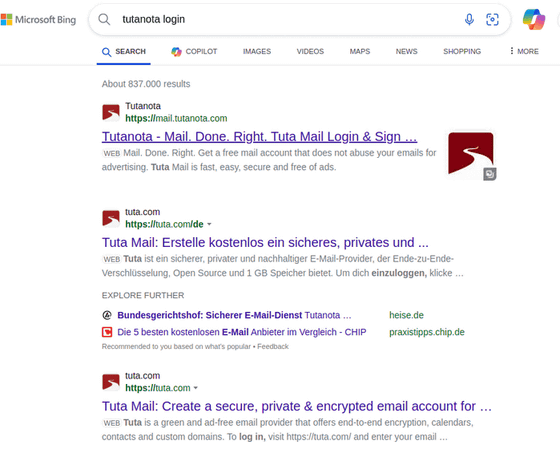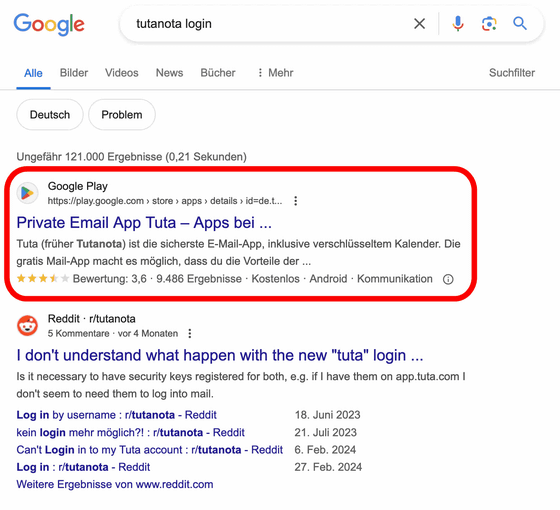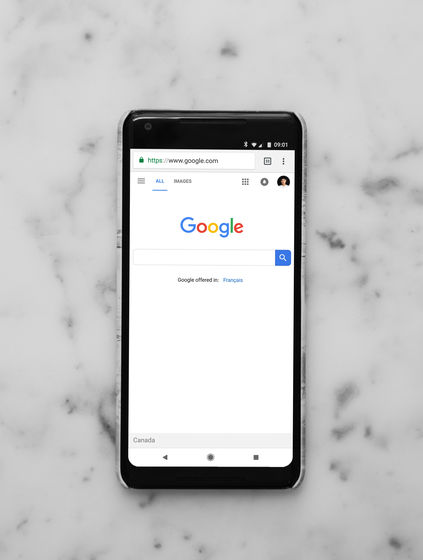Google's rival service Tuta claims that its service suddenly stopped appearing in Google searches

Tuta , which claims to be the world's most secure end-to-end encrypted email service, is suing Google, which has deliberately prevented it from appearing in Google searches. Because Google operates the email service Gmail, Tuta argues that Google is affecting the profits and marketability of Tuta, a competing service to Gmail, in violation of
Google Search Is A Problem: How Google Is Crushing Tuta.
https://tuta.com/blog/google-search-problem

Tuta (formerly Tutanota) is the world's second most popular encrypted email service, based in Germany. However, it claims that since around April 2024, Tuta has stopped appearing correctly in Google's search engine, Google Search.
If you search for 'Tutanota login' in Germany, where Tuta is based, using Google Search, you won't see Tuta at the top of the search results page. Instead, you'll see links to the Android version of the Tuta app on Google Play and a Tuta-related thread on Reddit.

On the other hand, search engines like
DuckDuckGo

For Bing

Therefore, Tuta pointed out, 'This search result is clearly a problem that only Google Search has. This is having a serious impact on our business.' Although Tuta is blocked in Russia , even if you search for 'Tutanota login' on the Russian search engine Yandex, the Tuta website appears at the top of the search results page.
'If Google can't find Tuta's website, we lose business,' Tuta wrote, because Google is the dominant search engine in North America and Europe.
Also, from August 2023 to March 2024, when searching for 'secure email' or 'encrypted email' in Google search, Tuta's website appeared at the top of the search results page. However, it seems that Tuta will no longer appear after April 2024.
Tuta contacted Google directly to ask why its website was no longer ranked at the top of the search results page. Tuta also tried to contact Google through its official community, contacted people working at Google privately, and contacted them through X, but no one responded.
Tuta noted, 'This must be a sensitive issue for Google, given that the DMA came into effect in March 2024. It was around this time that Tuta began to disappear from the top of Google search results pages.'

The DMA requires
Next, Tuta conducted a study to see if Google prioritizes its own products in Google searches. When they searched for 'Tutanota login,' the first link to Google's service, Google Play, appeared, so 'the conclusion is clear,' Tuta said. 'If this isn't Google's priority, then what is?'

'This case clearly shows how Google can use its gatekeeping power to harm competitors,' Tuta wrote. 'It's great to see the DMA now in place to help companies fight for a level playing field and to help consumers find alternatives to the gatekeeping of big tech companies.'
'It's hard to compete with big tech companies like Google and Apple, who have endless funds for feature development and marketing,' Tuta founder Matthias Pfau said. 'But if they can make it even harder for smaller competitors with their own platforms, then competitors will never be able to break out of their niche and become mainstream providers in Apple's App Store or Google
In 2023, when Tuta was still Tutanota, Microsoft's email tool Outlook mistakenly treated emails from Tutanota as spam and completely blocked them from the Outlook mailbox. At this time, Tuta worked with Microsoft's support team for several weeks to try to resolve the issue, but the problem was never resolved. However, when a journalist appeared who claimed that he was facing the same problem, the problem was apparently resolved in just one day.
'While we don't have technical knowledge of what goes on inside Microsoft or Google, it's clear that bugs like this affect competitors like us all the time. Issues like this need to be taken seriously all the time, not just when a journalist brings them up,' Tuta wrote.

'Big tech companies like Google have the power to crush smaller providers, and complaints from smaller services are always ignored. That's why the big tech companies only address the problem when they feel pressured from the outside,' Tuta said. He argues that such problems show the need for an EU DMA.
Tuta also urged users to help by reporting the issue to Google, sharing and raising the issue on their favorite social media platforms like X or Mastodon, using tools from smaller providers like Tuta instead of the tools of larger companies, and reporting the issue to EU regulators.
Related Posts:
in Web Service, Posted by logu_ii







